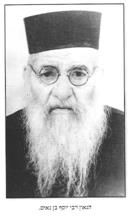A Short Tribute
Hacham Joseph Benaim was born in Fes, Morocco, in 1882.
He first studied with Rabbi Joseph Hacohen and then at the HaRav Gaon Rabbi Cohen's yeshiva. At the age of sixteen, he married Freikha Assouline. He was a victim of a malaria epidemic that killed many of the city's population, yet recovered and survived.
A revolt against the king worsened the situation of the city's Jews at the time, and riots and looting became more frequent. On 30 Nissan 5672 (1912), the gates of the mellah [Jewish quarter] were breached, and the riots reached the very doors of Hacham Joseph Benaim's home. He wrote a piyyut celebrating his rescue that was printed in his book, Nifleotecha Asikha.
Hacham Joseph Benaim earned a living from his work as a manuscript scribe, shochet and bodeq, and was in charge of the Fes shochatim (ritual slaughterers). He was a cantor and preacher at the Toshavim synagogue (Toshavim is the name given to Jews who lived in Morocco before the Sephardim's arrival end 15th century) and then at the Debdo community synagogue.
Hacham Joseph Ebnaim wrote some forty works during his lifetime, including books of Responsa – Tson Yosef and Kol Hadash, collections of laws – Yavin L'Akhraiuto, sermons – Tomeru L'Yosef, original commentary on Torah – Nimkar Yosef, a collection of poems – Nifleotecha Asikha, and his life's work – commemorating the history and biographies of the Maghreb's rabbis – Malkei Rabbanan, Kvod Melachim, Rav Tuvcha Yabi'u and Ma'aseh Tzaddikim (from Rabbi Moshe Amar's introduction to the Magid La'Adam Hagaddah).
